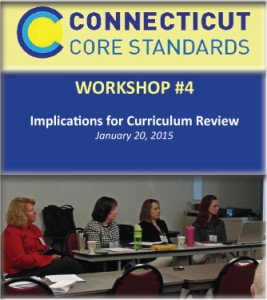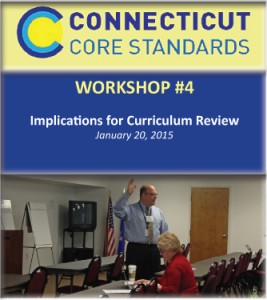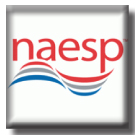CCS LEADERSHIP COMMUNITY OF PRACTICE – WORKSHOP #4
 |
DATE: January 20, 2015
Keynote Speaker: Dr. Erin McGurk, Director of Educational Services, Ellington Public SchoolsPresenters:
|
 |
ACHIEVE THE CORE
 Professional Development Modules Professional Development Modules
These modules include facilitator’s guide, PowerPoint presentations, videos, and hands-on activities; to be used in group settings or for individual study. |
 Introducing the Common Core to Parents and Community Members Introducing the Common Core to Parents and Community Members
This module includes facilitator’s guide and a PowerPoint presentation, to be used for informing parents and the community about the Common Core. |
THE COUNCIL OF CHIEF STATE SCHOOL OFFICERS
 Common Core Implementation Video Series Common Core Implementation Video Series
Commissioned by the Hunt Institute and the Council of Chief State School Officers, this series of video vignettes are organized by ELA and Math. They can be used to explain the Common Core Standards in greater depth to diverse stakeholder groups how the Standards will improve teaching, make classrooms better, create shared expectations, and cultivate lifelong learning for all students. The segments can be used individually or can easily be linked together to create a customized package. http://www.ccsso.org/Resources/Digital_Resources/Common_Core_Implementation_Video_Series.html |
FISCHER AND FREY: LITERACY FOR LIFE
 How to Create a Culture of Achievement in Your School and Classroom: Book and PowerPoint How to Create a Culture of Achievement in Your School and Classroom: Book and PowerPoint
These tools include a PowerPoint presentation covering content from the book by authors Fisher, Frey, and Pumpian. They can be used independently or together as part of a presentation or book study. |
GREAT SCHOOLS PARTNERSHIP
 Grading + Reporting: Proficiency-Based Learning Simplified Grading + Reporting: Proficiency-Based Learning Simplified
In this section, school leaders and teachers will find detailed guidance on developing a proficiency-based grading and reporting system. One of the primary goals of a proficiency-based grading system is to produce grades that more accurately reflect a student’s learning progress and achievement, including situations in which students struggled early on in a semester or school year, but then put in the effort and hard work needed to meet expected standards. If you ask nearly any adult, they will tell you that failures—and learning to overcome them—are often among the most important lessons in life. Yet many traditional grading systems penalize students for a single failure or poor test performance. Failures are nearly always encountered on the path to understanding and success, and proficiency-based approaches to grading can help teachers, students, and parents to focus on the end goal—learning the most important knowledge and skills—rather than the struggles or mistakes made along the way. Another advantage of proficiency-based grading is that learning progress and achievement are more clearly documented for students and parents. Consider, for example, this question: What does a C mean? While the grade is a deeply familiar symbol, and more or less everyone has received a C at some point, what does the grade actually convey about learning? What was taught in the course? What knowledge did those C students acquire? What skills did they learn? Can the students write well, do math, conduct research, think critically, communicate effectively, or use a computer? Did they work hard and make a lot of progress over the semester, or did they slack off and hardly try at all? The fact is that a C just doesn’t tell us much. When proficiency-based grades are connected to clearly articulated learning standards, educators and parents know, with far more precision, what a student has actually learned or failed to learn. http://www.greatschoolspartnership.org/proficiency/grading-reporting// |
NAESP
 Implementing the Common Core State Standards: The Role of the Elementary School Leader Action Brief Implementing the Common Core State Standards: The Role of the Elementary School Leader Action Brief
This is an Action Brief for elementary school leaders designed to increase awareness of the standards, create a sense of urgency around their implementation, and provide principals with a deeper understanding of the standards and their role in implementing the standards. Achieve, in partnership with College Summit, the National Association of Secondary School Principals, and the National Association of Elementary School Principals, released this with support from MetLife Foundation. |




